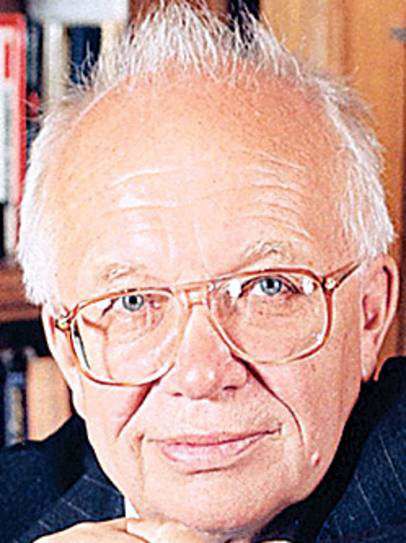Son of Nikita Khrushchev to bring wide perspective to Bend talk
Published 5:00 am Saturday, May 24, 2008

- Sergei Khrushchev
As the son of Soviet premier and Communist Party leader Nikita Khrushchev, Sergei Khrushchev had a front row seat to some of the biggest events of the mid-20th century.
While his father rose to and fell from power at the helm of the Cold War superpower in the 1950s and ’60s, the younger Khrushchev worked as a engineer for his country’s missile and space programs, completed a master’s degree, and began a career as a scholar and writer on Soviet history, economic development and international security. And as the century came to a close, Khrushchev did something unexpected — he moved to Rhode Island and became a citizen of the country that had once been the Soviet Union’s greatest rival.
Trending
Today, Khrushchev, 72, is a senior fellow at Brown University’s Thomas J. Watson Jr. Institute for International Studies. He spends his time writing and lecturing about politics, security, economics and his father’s legacy — topics he will discuss next month, when he stops in Bend to give a presentation titled “Can Russia Have Two Tsars: Medvedev and Putin?” at the Tower Theatre.
The lecture, which is being organized by the World Affairs Council of Oregon, the Nancy R. Chandler Visiting Scholar Program and the City Club of Central Oregon, is the only Central Oregon event scheduled for Khrushchev’s first visit to the state.
In a phone interview from his Providence, R.I., office this week, Khrushchev said he’s looking forward to sharing his story, as well as his thoughts on both the history of the Soviet Union and the future of Russia. In his presentations across the country — and around the world — Khrushchev said he tries to shed some light on the complex process of developing a functioning democracy out of a communist state.
“Americans have this, I would not say primitive, but a simplified understanding that our democracy is the best in the world, and that we can make a democratic society overnight in Russia, China, Iraq, Afghanistan and everywhere,” he said. “This is a very big mistake, because a democracy is not just about having free elections or a free press … the transition to democracy is very long, it will take decades.”
Khrushchev said it’s hard to predict just what the future holds for Russia, because its government has recently shifted in an unprecedented way.
Earlier this month, after almost a decade as Russia’s president, Vladimir Putin stepped down from his post and a new president, Dmitry Medvedev, took office. In the past, Khrushchev said new leaders assumed office only after the premier or president died or was forced out.
Trending
This time, however, Putin is far from out of the picture — as the country’s prime minister, he remains on the forefront of Russia’s political landscape, along with Medvedev.
“With two leaders, it will be very interesting to watch what happens,” Khrushchev said. “It’s like being a detective — you don’t know what will happen next.”
After more than 15 years in the U.S., Khrushchev said he now feels at home in his adopted country, living a life that he never dreamed of as a young person in the Soviet Union.
“I could never have tried to imagine this — I thought (the USSR) would be ahead of the United States’ level of life,” he said. “I never thought that the Soviet Union would fall apart. That’s why life is interesting because you don’t know the future. I like this country and I’m happy I can live here.”
And Khrushchev said he’s glad to be able to keep the story of his father alive through books and conversations with people who only knew him as a sometimes-volatile leader of a Cold War rival.
“Americans looked at him as an enemy, had fear,” he said. “But he was a nice person and he wanted to tell people in the world to live in peace … there were many misconceptions but that was part of us living in the Cold War — you cannot create positive images of the enemy.”
Nikita Khrushchev timeline
If you go
1894: Nikita Sergeyevich Khrushchev is born into a poor family in southwestern Russia
1939: Khrushchev becomes a member of the Politburo, the executive association of the Soviet Communist Party
1953: Soviet Communist Party head Joseph Stalin dies, Khrushchev becomes leader of the party
1956: Khrushchev denounces Stalin in a speech, begins attempts to improve cultural and intellectual freedom in the Soviet Union
1960: An American U-2 spy plane is shot down over the Soviet Union; Khrushchev condemns American surveillance of Soviet missile programs
1962: Cuban Missile Crisis; Soviet Union installs nuclear missiles in Cuba, President John F. Kennedy orders a blockade of Cuba until the missiles are removed
1964: Khrushchev forced out of office by political opponents, replaced by Leonid Brezhnev
1971: Khrushchev dies in Moscow
Source: BBC History – www.bbc.co.uk/history
Sergei Khrushchev, a senior fellow at the Watson Institute for International Studies at Brown University, will present “Can Russia Have Two Tsars: Medvedev and Putin?” at 7 p.m. June 3 at the Tower Theatre in Bend. For more information or to reserve tickets, visit www.cocc.edu/foundation or www.towertheatre.org or the Tower Theatre box office. Tickets are $25 for premier reserved seating, which includes an invitation to attend a post-event meeting with Khrushchev, and $15 general reserved seating.








